Trump's frantic week of peace brokering hints at what he really wants
Vocabulary: 717, Words: 1732

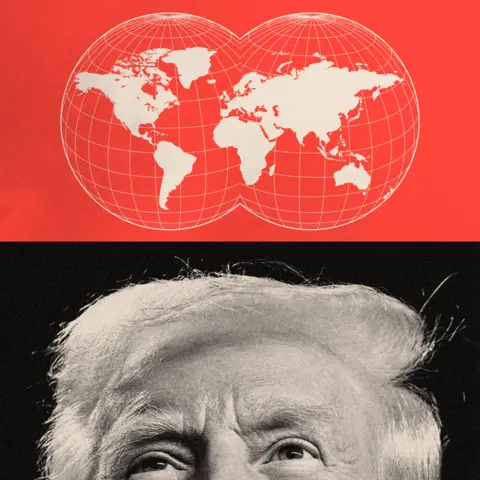
1"There are decades where nothing happens; and there are weeks where decades happen." 2So supposedly said the Russian revolutionary leader Vladimir Ilyich Lenin. 3The diplomatic whirlwind that has surrounded US President Donald Trump this week suggests the old Bolshevik might have been onto something.
4For the protectionist president, who promises always to put America First, has in recent days instead been busy bestriding the world stage.
5He and his team have done business deals in the Gulf; lifted sanctions on Syria; negotiated the release of a US citizen held by Hamas; ended military strikes on Houthi fighters in Yemen; slashed American tariffs on China; ordered Ukraine to hold talks with Russia in Turkey; continued quiet negotiations with Iran over a nuclear deal; and even claimed responsibility for brokering a ceasefire between India and Pakistan...
6The pace has been breathless, leaving allies and opponents alike struggling to catch up as the US diplomatic bandwagon hurtled from issue to issue.
7"Just, wow!" remarked one London-based ambassador. 8"It is almost impossible to stay on top of everything that's going on."
9So what is going on? 10What have we learned in this frantic week about the US president's emerging foreign policy? 11Is there something approaching a Trump doctrine - or is this just a coincidental confluence of global events?
12Pomp and flattery in Saudi
13A good place to start, perhaps, is the president's visit to the Gulf where he set out - in word and deed - his vision for a world of interstate relations based on trade, not war. 14In a speech in Riyadh, Trump said he wanted "commerce not chaos" in the Middle East, a region that "exports technology not terrorism".
15His was a prospect of a breezy, pragmatic mercantilism where nations did business deals to their mutual benefit, a world where profit can bring peace.

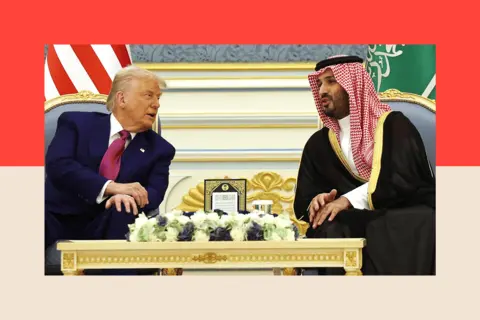
16As he enjoyed the flattery of his Saudi hosts and the obeisance of visiting dignitaries, the president signed - with his fat felt tip pen - deals that the White House claimed represented $600bn of investment in the US.
17This was Trump in all his pomp; applauded and rewarded with immediate wins he could sell back home as good for American jobs.
18Some diplomats privately questioned the value of the various memorandums of understanding. 19But the show, they said, was more important than the substance.
20A 'none of our business' approach
21Absent from Trump's speech was any mention of possible collective action by the US and other countries; no talk of multilateral cooperation against the threat of climate change, no concerns about challenges to democratic or human rights in the region. 22This was a discourse almost entirely without reference to ideology or values except to dismiss their significance.
23Rather, he used his speech to Saudi leaders to make his clearest argument yet against Western interventionism of the past, attacking what he called "the so-called nation-builders and neo-cons" for "giving you lectures on how to live or how to govern your own affairs".
24To the applause of his Arab audience, he said these "Western interventionists" had "wrecked more nations than they built", adding: "Far too many American presidents have been afflicted with the notion that it's our job to look into the souls of foreign leaders and use US policy to dispense justice for their sins.
25"I believe it's God's job to sit in judgement. 26My job is to defend America."

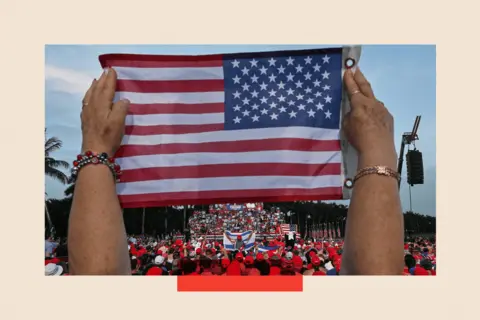
27That reluctance to intervene was on show in recent days when it came to the fighting between India and Pakistan. 28In the past, the US has often played a key role seeking to end military confrontations in the subcontinent. 29But the Trump White House was initially cautious about getting involved.
30Vice-President JD Vance told Fox News the fighting was "fundamentally none of our business… We can't control these countries".
31In the end, both he and Secretary of State Marco Rubio did make calls, putting pressure on both nuclear powers to de-escalate. 32So too did other countries.
33When the ceasefire was agreed, Trump claimed US diplomacy had brokered the deal. 34But that was flatly dismissed by Indian diplomats who insisted it was a bilateral truce.
35Pros of policy in one man's hands
36The centrality of Trump to US foreign policy has also become apparent this week. 37This is more than just a simple truism. 38On show was the lack of involvement of other parts of the US government that traditionally help shape US decision-making overseas.
39Take the president's extraordinary decision to meet Syria's new president and former jihadist, Ahmed al-Sharaa, and lift sanctions on Syria. 40This showed the potential advantage of having foreign policy in one man's hands: it was a decisive and bold step. 41And it was clearly the president's personal decision, after heavy lobbying by both Turkey and Saudi Arabia.
42It was seen by some diplomats as the quid pro quo for the diplomatic fawning and investment deals Trump received in Riyadh. 43Not only did the decision surprise many in the region but it also surprised many in the American government.
44Diplomats said the State Department was reluctant to lift sanctions, wanting to keep some leverage over the new Syrian government, fearful it was not doing enough to protect minorities and tackle foreign fighters.
45Diplomats say this pattern of impulsive decision-making without wider internal government discussion is common in the White House. 46The result, they say, is not always positive.


47This is due, in part, to Trump's lack of consistency (or put simply, changing his mind).
48Take the decision this week to do a deal with China to cut tariffs on trade with the US. 49A few weeks ago Trump imposed 145% tariffs on Beijing, with blood thirsty warnings against retaliation. 50The Chinese retaliated, the markets plunged, American businesses warned of dire consequences.
51So in Geneva, US officials climbed down and most tariffs against China were cut to 30%, supposedly in return for some increased US access to Chinese markets. 52This followed a now-familiar pattern: issue maximalist demands, threaten worse, negotiate, climb down and declare victory.
53Limitations of his 'art of a deal'
54The problem is that this "art of a deal" strategy might work on easily reversible decisions such as tariffs. 55It is harder to apply to longer term diplomatic conundrums such as war.
56Take Russia's invasion of Ukraine. 57On this, Trump's policy has been fluid, to put it mildly. 58And this week was a case in point.
59Last Saturday the leaders of the UK, France, Poland and Germany visited Kyiv to put on a show of support for Ukraine President Volodymyr Zelensky. 60And in a group call with Trump on French President Emmanuel Macron's phone, they spelled out their strategy of demanding Russia agree an immediate 30-day ceasefire or face tougher sanctions.
61This was Trump's policy too. 62The day before he wrote on social media: "If the ceasefire is not respected, the US and its partners will impose further sanctions." 63But then on Sunday, President Vladimir Putin suggested instead there should be direct talks between Ukraine and Russia in Turkey on Thursday. 64Trump immediately went along with this, backtracking on the strategy he had agreed with European leaders a day earlier.

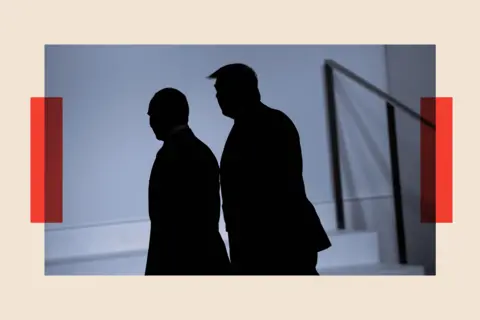
65"Ukraine should agree to (these talks) immediately," he wrote on social media. 66"I am starting to doubt that Ukraine will make a deal with Putin."
67Then on Thursday, Trump changed his position again, saying a deal could be done only if he and Putin were to meet in person.
68This puzzles some diplomats. 69"Does he genuinely not know what he wants to do about the war in Ukraine?" one remarked to me. 70"Or does he just grasp at what might offer the quickest resolution possible?"
71A snub to Netanyahu?
72Into this puzzling mix fell two other decisions this week. 73First, Trump agreed a ceasefire after a campaign bombing Houthi fighters in Yemen for almost two months. 74There have been questions about the effectiveness of the hugely expensive air strikes, and the president's appetite for a long military operation. 75He repeatedly told his Arab hosts how much he disliked war.
76Second, Trump's envoy, Steve Witkoff, held his fourth round of talks with Iran over efforts to curb their nuclear ambitions. 77Both sides are hinting that a deal is possible, although sceptics fear it could be quite modest. 78Talk of joint US-Israeli military action against Iran seems to have dissipated.

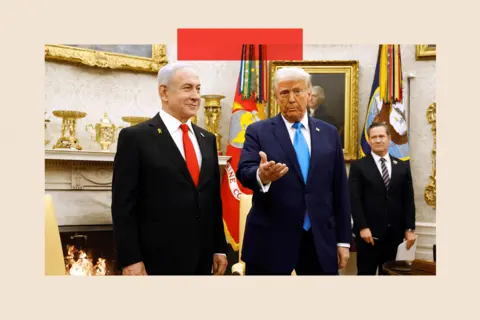
79What unites both issues is that the United States was acting directly against the wishes of Israel. 80Benjamin Netanyahu may have been the first world leader invited to the Oval Office after Trump's inauguration, but in recent days, he seems to have been snubbed. 81Trump toured the Middle East without visiting Israel; he lifted sanctions on Syria without Israel's support. 82His Houthi ceasefire came only days after the group attacked Tel Aviv airport.
83Diplomats fear Netanyahu's reaction. 84Could the spurned prime minister respond with a more aggressive military operation in Gaza?
85Capitalism to overcome conflict
86So after this week of diplomatic hurly burly, how much has changed? 87Perhaps less than might appear.
88For all the glitz of Trump's tour through the Middle East, the fighting and humanitarian crisis in Gaza continues unresolved. 89A fresh Israeli offensive seems imminent. 90One of Trump's chief aims – the normalisation of relations between Israel and Saudi Arabia - remains distant.
91For all the talks about ending the war in Ukraine, there is no greater likelihood of the guns falling silent. 92Putin's ambitions seem unchanged. 93And for all the deals to cut US tariffs, either with the UK or China, there is still huge global market instability.

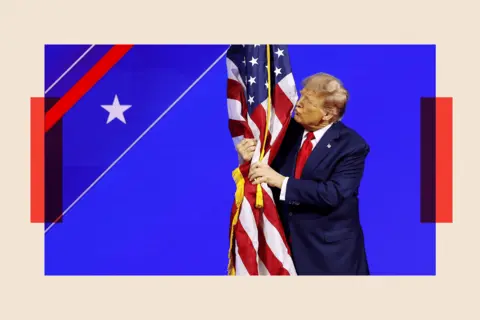
94We do have a clearer idea of Trump's global ideology, one that is not isolationist but mercantilist, hoping optimistically that capitalism can overcome conflict. 95We also have a clearer idea of his haste, his desire to clear his diplomatic decks – in the Middle East, Ukraine and the subcontinent – so he can focus on his primary concern, namely China.
96But that may prove an elusive ambition. 97If there are weeks when decades happen, there are also weeks when nothing happens.
98Top picture credit: Getty Images
99BBC InDepth is the home on the website and app for the best analysis, with fresh perspectives that challenge assumptions and deep reporting on the biggest issues of the day. 100And we showcase thought-provoking content from across BBC Sounds and iPlayer too. 101You can send us your feedback on the InDepth section by clicking on the button below.
from BBC